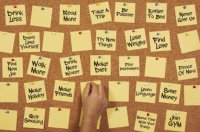Helping Students Set Goals and Find Success
Your content has been saved!
Go to My Saved Content.The idea of New Year's Resolutions is very appealing but their success rate is low. Cognitive psychologists know why: Resolutions tend to be too big (like losing 20 pounds), too vague (like getting more sleep), very hard to control (like having less stress), or something the person is ambivalent about (like becoming a healthier eater).
When students come back for the second half of the school year, we often want them to "turn over a new leaf," or address particular difficulties they faced in the prior weeks.
Focus on Short-Term Success
So let's travel back to my blog in August and revisit the idea of the End-of-Year Legacy. But let's do it in a way that is likely to generate some short-term success. This activity is best done in home room/advisory/morning meetings, or some time other than a particular academic class, because you want the students to be able to select the area of their focus.
For fourth to twelfth grade, ask each of your students to pick two things that it is important for them to learn, or to improve on, in the next three weeks. Have them write one on one side of an index card, and the other on the other side. Go around and have some students share their goals so that you can be sure students are picking things that are reasonable and within their control (e.g., getting an A is not appropriate; studying more regularly, handing in assignments, completing an upcoming project are all appropriate).
Then, have them share with a classmate and have the classmate help them write a plan for how they will be successful. Have them help one another, and then share the plans with another pair of classmates who will give feedback. Then, have them write up their revised goal and plans on a new index card and submit it to you, along with the name of the student who helped them initially. (Note that it is perfectly acceptable for students to choose character/behavior goals.)
Once you get the cards, your task is to help make what they wrote more realistic and attainable and to inform others who are involved about the students' goal and plans. For example, if a student in your advisory class is most interested in an art project, then you would so inform the art teacher. Of course, students will need a copy of their plans.
Each week, ask them for a progress report and whether they need some help and/or need to refine their plan. In case of the former, consider pairing the student with a classmate who has strength in the area where the student needs support.
Is It Worth It?
Why is this worth the trouble? You are banking on the well-documented contagious effect of success. Akin to Malcolm Gladwell's concept of the "tipping point," at some point specific goal achievement allows students to try tackling other goals using the same approach, and the supports available from peers and adults in the school.
Too often, we ask students to tackle their areas of greatest deficit prematurely. First, we need to have them build skills and confidence in an area that is genuinely important to them, and then they need to have a success experience. From small successes, larger successes can be built. There is no other social-emotionally responsible way to expect students (or just about anyone, for that matter), to improve.
